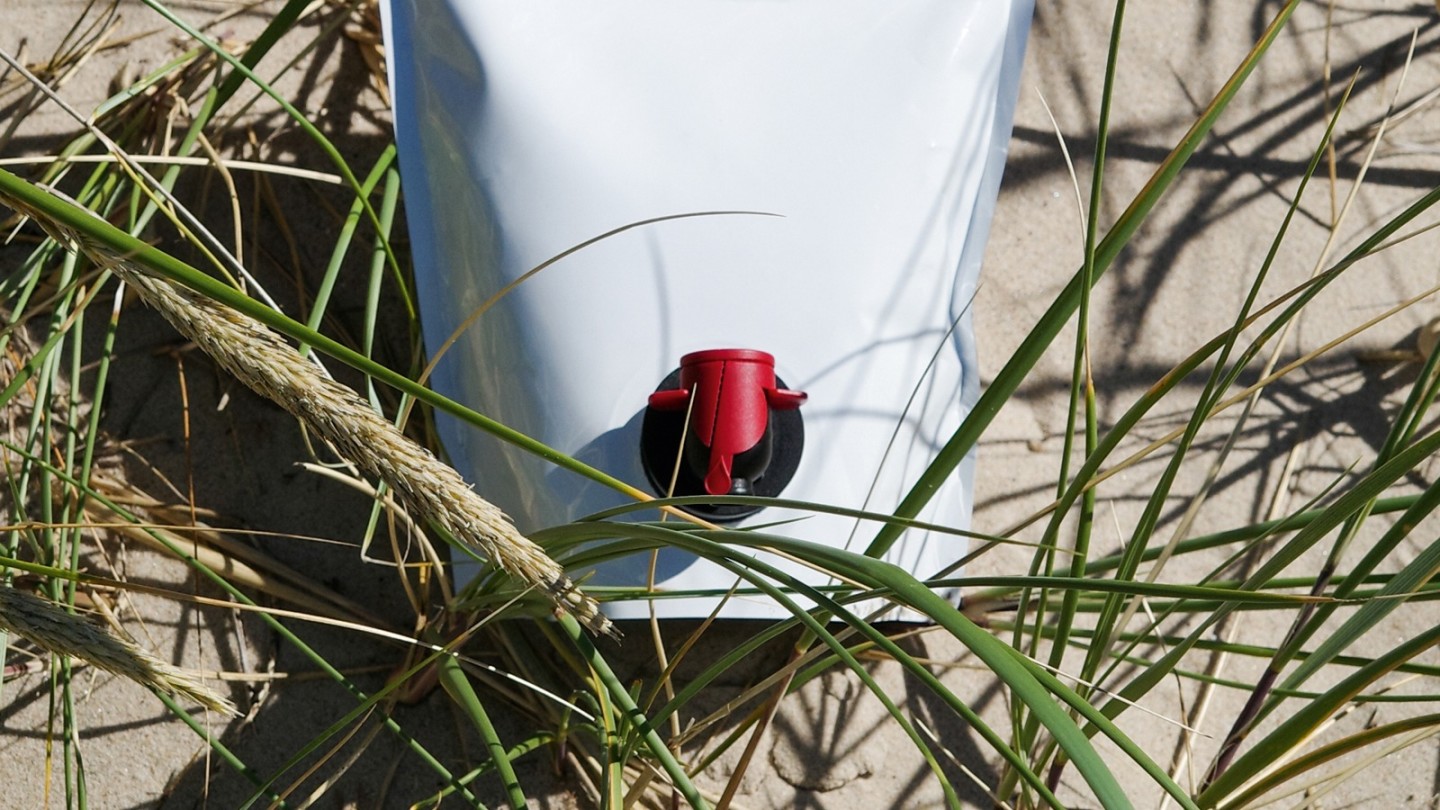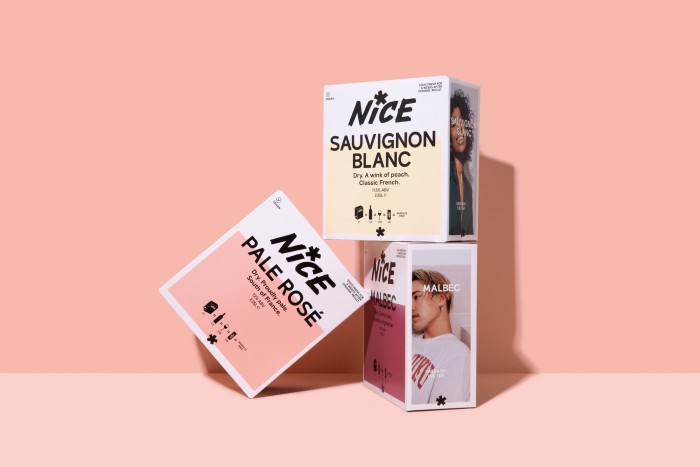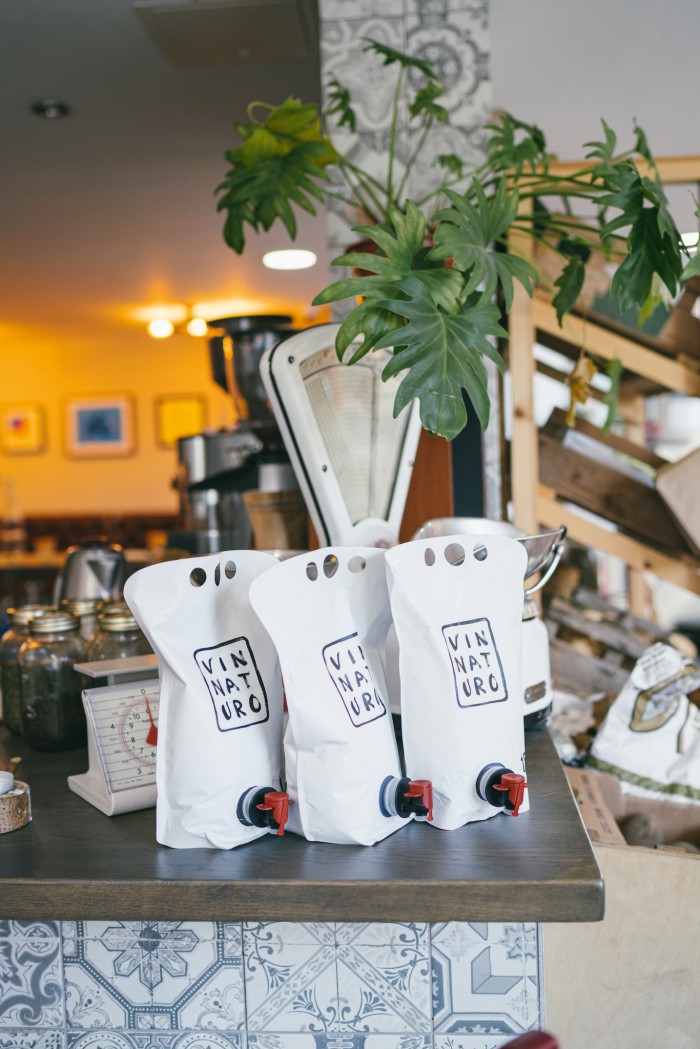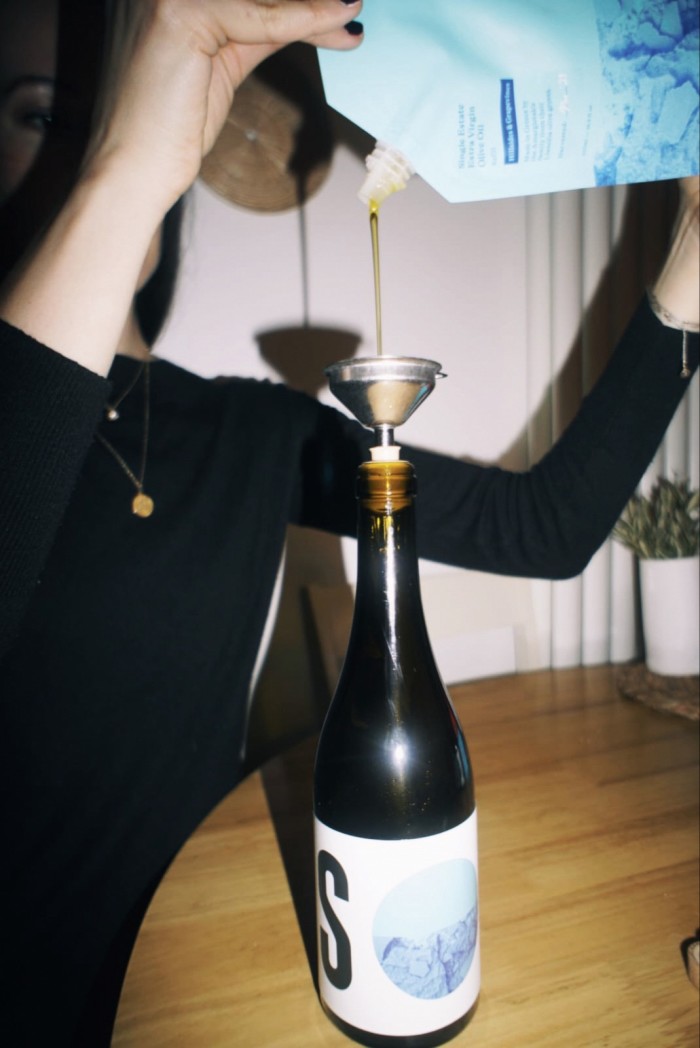Give traditional packaging the sack

Simply sign up to the Sustainability myFT Digest -- delivered directly to your inbox.
A squirt of olive oil? As far as recipe measures go, this might seem unorthodox; as an ingredient, olive oil has been bottled and poured for millennia. But Theophilos Constantinou wants to change that. The thirtysomething co-founder of Psyche Organic, a Copenhagen-based brand that makes small-batch olive oils from a single, traceable estate, packages his product not in a bottle but a one-litre bag with a plastic tap.
It’s unconventional, for sure. Inspired by boxes or “goon bags” of budget wine, these pouches are more often to be found on the lower rungs of the supermarket shelf, in no way associated with the niche or artisanal. But grown biodynamically on a family-run farm on the north-west Peloponnese, Psyche’s oil retails at DKr299 (about £35). “People don’t know what true cold-pressed olive oil tastes like,” says Constantinou, whose parents are Greek. He says he grew up “swimming in it… Greek households don’t use butter”. He discovered bags were actually better for the product than glass: they keep out light and oxygen to “protect our aromas and freshness”. They’re potentially better for the planet too.

Glass has increasingly come under scrutiny from environmentalists. It’s considered a lower-impact material simply because it’s not plastic, and is infinitely – and easily – recyclable. But life-cycle assessments conducted by the University of Southampton found glass – carbon-heavy to create at 1,700°C, prone to breakage and which uses more energy in recycling than alternatives – had “the highest impacts out of [all] packaging options [for liquids], followed by plastics and aluminium cans” in a 2019 study. And that’s just in production: those weighty emissions rack up even more when used for products such as olive oil and wine, which are bottled and transported around the globe. (In the US, only 25 per cent of glass bottling is ever recycled; in the UK, it’s 50 per cent. The rest ends up in landfill.)

Psyche Organic is among a new crop of eco-minded businesses cultivating bagged goods as a lower-impact solution. Predominantly made from regenerated plastic, pouches are easily recycled via kerbside bins and account for just 96g of CO2 emissions per 1.5-litre pouch. (Glass is 675g of CO2 for half the amount of wine, according to a 2019 study by eco-advisory firm Gaia Consulting.) YesColours, a British paint company, offers water-based, candy-hued paints in one-litre bags (£21) which can be rinsed out and recycled: paint tins are hard to dispose of and often end up in the bin. In the UK, “14,000 tonnes of tins go straight to landfill every year”, says founder John Stubbs: his paint bags use 16 per cent fewer fossil fuels, 26 per cent less water and generate 21 per cent less greenhouse gas than aluminium cans. And Ordo, the oral-care brand, sells pouches of dilutable mouthwash on subscription. One 80ml pouch is the equivalent to four ordinary bottles: why ship water when it’s readily available from the tap?
Meanwhile, booze brands such as Nice wine (£21.50 for 2.25 litres), Glaswegin (£32.95 for 70cl) and VinNaturo (a biodynamic orange wine, £25 for 1.5 litres) are sold in independent wine stores and deli webshops. And so fundamental is the bag to the British wine sourcer Le Grappin, it went as far as patenting the word “bagnum”. “It was hard to sell them at first; customers expected low-quality wine so thought they were expensive,” says co-founder Emma Nielsen of her Côtes du Rhônes and rosés, which cost £30 for a 1.5-litre bag. Produced by Irish firm Smurfit Kappa, the pouches are so lightweight that a five-litre bag has 80 per cent lower carbon emissions than glass packaged wines, according to the company.


Attractive designs have helped shift perception. “We try to show how nice a pouch can be,” says Sarah Vachon, co-founder of Citizens Of Soil, an olive-oil brand that sells its product in an arty-looking pouch (£13.50 for one litre) splashed with hues of Yves Klein Blue and abstract graphics of the limestone soil in which it grows. Its tasting notes include freshly cut grass, green banana and tomato leaf. The brand takes responsibility for the afterlife of its bags too: if recycling isn’t available, customers can return them using a freepost address. “I find it frustrating when I see luxury brands investing in nice packaging only to expect you to throw it away and buy it all over again,” Vachon says.

Bags can also help cut down on product waste. Wine and oils stay fresher for longer – two to three weeks after opening for wine, and more than six months for olive oil, according to Constantinou (olive oil ordinarily dates after three months once air gets in). “The entire proposition for YesColours had to be sustainable, not just one part,” says Stubbs, who says he got “a fair few raised eyebrows” when he tried to convince manufacturers to bag his paint. Each pouch features a milk-carton style screw top and a clear window, making the contents visible and easier to pour. “Tins are difficult to open, reseal, or dispose of safely.” He sells them by the litre, with an on-site calculator to predict the volume each customer will need for their paint project: it stops half-empty tins ending up in the bin.
Psyche sells one-litre pouches rather than half-litres to encourage consumers to make fewer orders; Le Grappin’s bagnums are two-bottles-in-one. “Ten one-litre pouches might be the same volume as 20 smaller ones, but it’s 10 fewer T-taps and 60 to 70 per cent less plastic we need to produce,” says Constantinou, who supplies restaurants including Atelier September in Copenhagen and Scarrs Pizza in New York with bigger-volume bags. (Last month, he opened a Psyche café in Copenhagen, where his oil is used in bulk.) Citizens Of Soil is also trialling five-litre containers with London restaurants including Silo, Leroy and Crispin.
In the era of online grocery shopping, both oil brands offer subscription models to encourage customers not to default to store-bought bottles. “Pouches don’t require the amount of protective packaging to prevent breakages like we need with glass,” says Vachon. And, emission-wise, “that last-mile transport actually accounts for a lot”. Bags have less baggage, it seems.

Comments